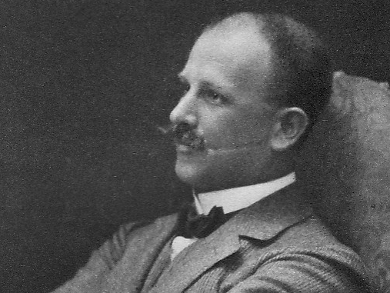Richard Wilhelm Heinrich Abegg was born on January 9, 1869, in Gdańsk in today’s Poland (then Prussia). He studied chemistry in Kiel, Tübingen, and Berlin, all Germany. Abegg received his Ph.D. in 1891 in Berlin under the supervision of August Wilhelm von Hofmann. He then worked with Wilhelm Ostwald in Leipzig, Germany, with Svante Arrhenius in Stockholm, Sweden, and with Walther Nernst in Göttingen, Germany.
In 1899, Abegg joined the chemical institute in Breslau (today Wrocław, Poland) as Lecturer. Clara Immerwahr received her Ph.D. in 1900 under Abegg’s supervision. She was the first woman to earn a Ph.D. there. In 1909, Abegg became Full Professor at the Technical University of Breslau.
Abegg is best known as a pioneer of valence theory. In 1904, he proposed an important rule concerning chemical valence: According to Abegg’s rule, the difference between the maximum positive and negative valence of an element is eight [1]. The concepts of negative and positive valence at the time were used similarly to positive and negative oxidation states today. Abegg’s rule is a precursor of the octet rule for main-group elements. Gilbert N. Lewis referred to the concept in a 1916 article, which developed into the octet rule [2].
Starting in 1901, Abegg served as Editor of the Zeitschrift für Elektrochemie. Besides his contributions to chemistry, Abegg was both a photography and a hot air balloon enthusiast. He had taken part in his first balloon flight in 1900 as part of his military service, and he later undertook frequent flights with his wife. Richard Abegg died on April 3, 1910, in a hot air balloon crash in Cieszyn in today’s Poland.
Richard Abegg is the answer to Guess the Chemist (85).
Reference
- [1] Die Valenz und das periodische System. Versuch einer Theorie der Molekularverbindungen (in German),
Richard Abegg,
Z. Anorg. Chem. 1904, 39, 330–380.
https://doi.org/10.1002/zaac.19040390125 - [2] The Atom and the Molecule,
Gilbert N. Lewis,
J. Am. Chem. Soc. 1916, 38, 762–785.
https://doi.org/10.1021/ja02261a002
Sources
- Obituary notices: Richard Abegg, 1869–1910; Michael Carteighe, 1841–1910; Oscar Guttmann, 1855–1910; Charles Hanson Greville Williams, 1829–1910,
Walter Hills,
J. Chem. Soc. Trans. 1911, 99, 599–609.
https://doi.org/10.1039/ct9119900599 - Richard Abegg (in German),
Svante Arrhenius,
Z. Elektrochem. 1910, 16, 554–557.
https://doi.org/10.1002/bbpc.19100161407
Also of Interest
- 125th Anniversary: Death of August Wilhelm von Hofmann,
ChemViews Mag. 2017.
Eminent organic chemist and first President of the German Chemical Society - 100th Anniversary: Clara Immerwahr’s Death,
ChemViews Mag. 2015.
A role model for her pursuit of science in spite of obstacles and for her strong moral convictions - 150th Birthday: Walther Nernst,
ChemViews Mag. 2014.
Walther Nernst is well known for his work in the areas of electrochemistry and thermodynamics



